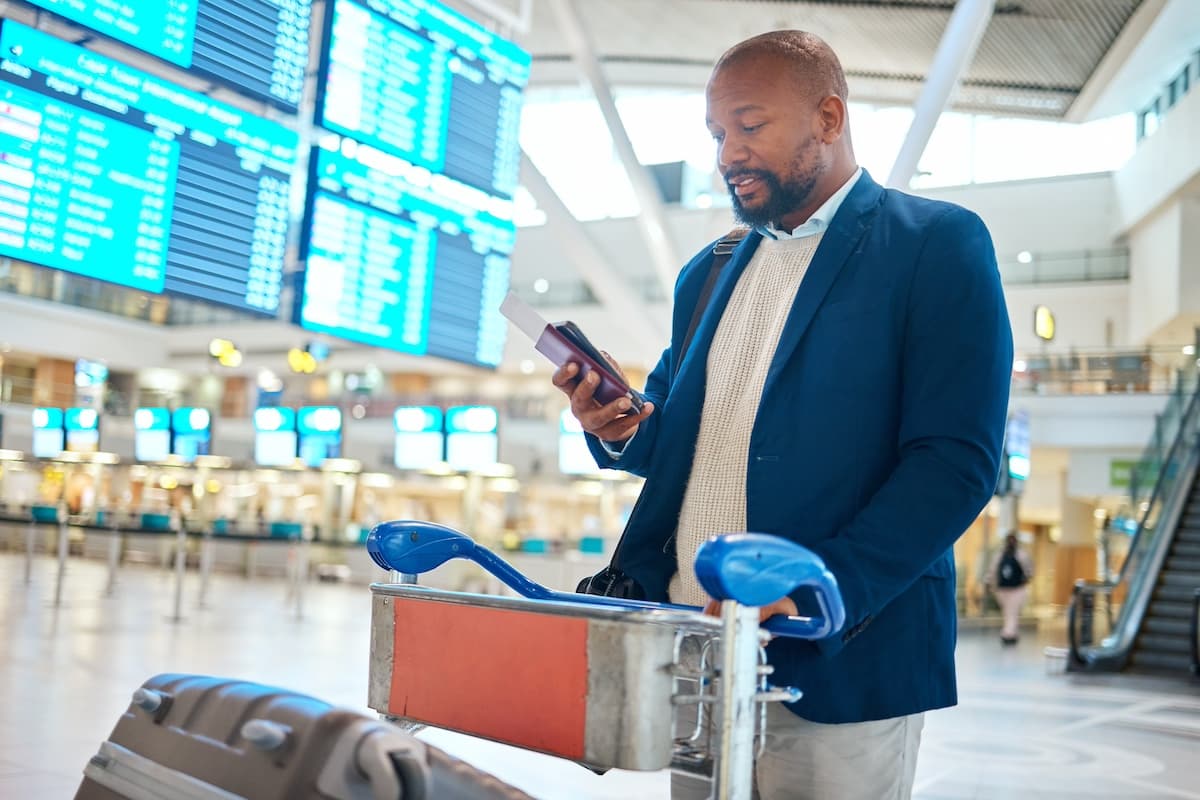In 2025, businesses embrace cutting-edge solutions to optimize their travel budgets, with AI in business travel and travel automation leading the way. From predictive analytics to personalized itineraries, these technologies transform how companies manage expenses and enhance efficiency. In this blog, we’ll explore how AI and automation reshape the travel management landscape, ensuring seamless and cost-effective journeys for organizations worldwide.
What is AI and Automation?

AI (Artificial Intelligence) uses advanced computer systems to mimic human intelligence, enabling machines to perform decision-making, problem-solving, and learning tasks. In the context of how AI can transform business travel, AI analyses large datasets to predict trends, optimize itineraries, and personalize experiences.
Conversely, automation involves using technology to perform repetitive tasks with minimal human intervention, streamlining processes like booking, approvals, and expense reporting. Together, AI and automation revolutionise corporate travel by saving time, reducing errors, and improving cost efficiency, making them indispensable tools for modern travel management.
How AI Is Revolutionising Business Travel Management
AI in business travel transforms travel management by introducing smarter, more efficient, and highly personalized solutions. It enables real-time itinerary optimization, offering tailored flight, accommodation, and transport options based on individual traveller preferences and corporate budgets. Through predictive analytics, AI anticipates cost fluctuations and suggests the best times to book, helping companies save significantly on travel expenses. Virtual assistants and chatbots powered by AI in business travel provide 24/7 support, handling tasks like itinerary changes, travel updates, or cancellations, ensuring smooth and stress-free journeys.
Additionally, AI-driven expense management tools automate the processing and categorization of receipts, reducing administrative workloads and improving accuracy. By integrating AI into business travel, businesses can enhance their travel programmes, increase efficiency, and provide employees with a seamless travel experience.
The Key Ways AI is Transforming Business Travel Management
- Personalised Itineraries: AI curates customized travel plans based on individual preferences, past bookings, and company policies.
- Predictive Analytics: It forecasts price trends for flights and accommodations, enabling businesses to book at the most cost-effective times.
- Real-Time Updates: AI-powered tools provide instant notifications on delays, cancellations, or alternative routes, ensuring minimal disruption.
- Expense Automation: Automates the collection, categorisation, and reporting of travel expenses, saving time and reducing errors.
- 24/7 Support: Virtual assistants and chatbots handle travel queries, itinerary changes, and booking modifications at any time of day.
- Policy Compliance: AI ensures all bookings align with corporate travel policies, reducing the risk of unauthorized expenses.
- Data Insights: Analyses travel patterns to identify opportunities for cost savings and efficiency improvements.
- Fraud Detection: AI enhances security by identifying anomalies in travel expense claims, protecting against potential fraud.
- Seamless Integration: Works with travel management platforms to streamline the entire process, from planning to reporting.
Travel Automation: The Key to Cost-Effective Corporate Journeys

Travel automation streamlines the complexities of corporate travel, helping businesses save time and money while improving efficiency. Companies can reduce manual errors and optimize their processes by automating repetitive tasks such as booking approvals, itinerary management, and expense reporting. For example, online booking tools like Deem and SAP Concur automate flight, hotel, and car rental reservations while ensuring compliance with corporate travel policies. Automated expense management platforms, such as Expensify, simplify receipt tracking and reimbursement processes, providing real-time expense reporting for faster approvals.
Additionally, intelligent travel assistants like chatbots handle routine inquiries, itinerary changes, and travel updates, offering round-the-clock support without human intervention. Automation also enables businesses to use dynamic pricing tools, which monitor market trends and secure the best rates for flights and accommodations. By leveraging travel automation, companies can achieve cost-effective travel solutions, enhance employee satisfaction, and free up resources for more strategic initiatives.
Why Automation is the Key to Cost-Effective Corporate Journeys
- Streamlined Booking Processes: Automation tools handle flight, hotel, and transport reservations, ensuring quick and efficient bookings.
- Policy Compliance: Automated systems ensure all bookings adhere to corporate travel policies, reducing unauthorised expenses.
- Real-Time Pricing Updates: Dynamic pricing tools monitor market trends, securing the best rates for flights and accommodations.
- Expense Management: Platforms like Expensify automate receipt tracking, expense categorisation, and reimbursements, saving time and reducing errors.
- Automated Approvals: Travel requests are automatically routed to the appropriate managers for swift approval, minimising delays.
- 24/7 Support: Smart assistants and chatbots manage travel inquiries, itinerary updates, and cancellations at any time.
- Data Analysis: Automation tools analyse travel data to identify cost-saving opportunities and optimise budgets.
- Reduction in Manual Errors: Automation eliminates human mistakes in booking, reporting, and expense management, ensuring accuracy.
- Improved Productivity: Employees spend less time on administrative tasks, focusing instead on core business activities.
- Enhanced Employee Experience: Automation provides smoother, faster, and stress-free travel management, boosting satisfaction.
Predictive Analytics: Anticipating Travel Trends and Costs
![]()
Predictive analytics uses historical data, statistical models, and machine learning algorithms to forecast future outcomes. In the context of corporate travel, it analyses past booking patterns, market trends, and real-time data to anticipate fluctuations in travel costs, identify high-demand periods, and predict traveller preferences. This enables businesses to make informed decisions and proactively plan their corporate travel strategies.
How Predictive Analytics Works:
- Data Collection: Aggregates data from past bookings, market trends, seasonal changes, and traveller behaviour.
- Pattern Recognition: Uses algorithms to identify trends, such as price increases during holidays or peak seasons.
- Real-Time Analysis: Continuously updates forecasts using current market data to refine predictions.
- Recommendations: Generates insights for optimal booking times, preferred travel routes, and cost-effective accommodation options.
Benefits for Businesses with Frequent Corporate Travel:
- Cost Savings: Businesses can book flights and accommodations when prices are predicted to be lowest, reducing overall expenses.
- Optimised Budgeting: Accurate forecasts enable companies to allocate their travel budgets effectively, avoiding unexpected cost spikes.
- Increased Efficiency: Travel managers can focus on strategy and planning rather than manually tracking market trends.
- Enhanced Traveller Satisfaction: Employees benefit from seamless, well-planned itineraries tailored to their preferences.
- Competitive Advantage: Businesses gain an edge by leveraging data-driven insights to refine travel programmes and negotiate better vendor deals.
How Worldgo Utilises AI and Automation to Streamline Business Expenses in 2025
Worldgo leverages cutting-edge AI and automation technologies such as Deem, Amadeus, and SAP Concur to transform business travel management and streamline 2025’s travel expenses. These tools seamlessly handle every aspect of corporate travel, from booking to reporting, ensuring efficiency, accuracy, and significant cost savings. Deem’s innovative online booking platform simplifies reservations, offering smart itinerary recommendations that align with corporate policies while optimising traveller convenience.
Amadeus enhances the process with powerful data-driven insights, delivering real-time pricing trends and route options, enabling businesses to secure the best deals quickly. Meanwhile, SAP Concur automates expense reporting, categorising, and processing receipts effortlessly, reducing administrative workloads and ensuring policy compliance.
Worldgo combines these advanced tools with expert travel management strategies, making it the go-to choice for businesses seeking a cost-effective, hassle-free travel solution. By integrating AI-driven platforms and automation, Worldgo saves time and provides actionable insights for smarter budgeting and planning. Check out why a tech-driven agency like Worldgo is far ahead of many traditional agencies in our recent blog.
Discover the power of AI and Automation in Business Travel Today
In 2025, AI in business travel and travel automation will reshape how companies manage their corporate journeys. Whether reducing costs through predictive analytics or ensuring seamless support with 24/7 automation, Worldgo tailors every travel experience to fit your business’s unique needs. By combining cutting-edge technology with expert management, Worldgo helps companies to maximise efficiency and minimize expenses, making it the ideal partner for all your corporate travel needs.






